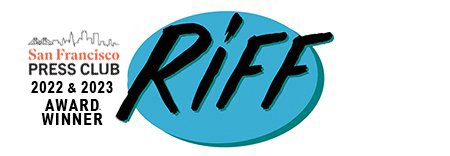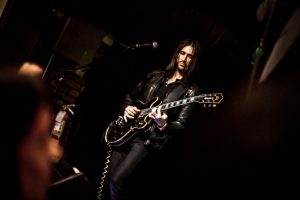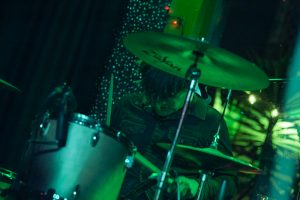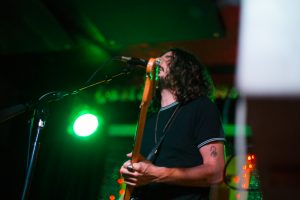Q&A: The Soft White Sixties settle into L.A. without forgetting their roots

Octavio Genera of The Soft White Sixties in San Francisco on March 24, 2018. Photos: Joaquin Cabello.
LOS ANGELES — Los Angeles rockers The Soft White Sixties don’t like to be put in a box. Their second LP, Alta California, is an eclectic and dynamic record that sees the band at its grooviest. This willingness to adapt and try new styles exemplifies the way that the Bay Area transplants challenge indie rock norms.
The Soft White Sixties
Fine Points, Niveles
8 p.m., Friday, Sept. 28
Bottom of the Hill
Tickets: $12-$17
“We wanted to just make a rock and roll record that felt good live and that had energy,” said frontman Octavio Genera, after meeting up for coffee with RIFF and guitarist guitarist Aaron Eisenberg at Zebulon Cafe in Elysian Valley. The cafe regularly plays host to both established and up-and-coming acts—the Dirty Projectors and Yumi Zouma made recent appearances—which showed The Soft White Sixties are figuring out the go-to hubs of indie music in L.A.
“At the same time we wanted to make a record that could stand alone and survive for someone at home listening on their headphones,” Genera said.
This mindset shows the group’s meticulous attention to detail, which manifests itself throughout the album, which the band released last month. The songs are incredibly layered and new sounds seemingly revealing themselves with each listen. The Soft White Sixties combine this with socially conscious lyrics and a genuine care for the state of the world, as seen on songs like “Brick by Brick,” which address Donald Trump’s wall and the band’s willingness to tear it down.
Not satisfied with simply making an album, Genera, Eisenberg, drummer Joey Bustos, bassist Ryan Noble and keyboardist Rob Fidel recorded it in both English and Spanish. Not only did this decision come after a finished record was ready to roll out, but the band had never even tried recording a single song in Spanish.
“There was a part of it that was really scary, and I think that’s the reason we did it,” Genera said. “We definitely didn’t want it to sound like an afterthought. In many ways we treated it with even more care because the Latino community is such an important part of me.”
Still, this might not be the most extreme thing The Soft White Sixties have done. In 2015, the band packed their bags and left the Bay Area—and the music community that launched its career—to live and work in Los Angeles.
RIFF: How does it feel to have finally released Alta California?
Octavio Genera: Its been a huge relief. I think it always takes longer than you think its going to take. The last 10 percent, honestly, took the longest. But that may be what happens when you decide to go back and record a whole album in Spanish.
Aaron Eisenberg: The whole process of this record was different. We wrote everything in the studio and there was not really any kind of pre-production.
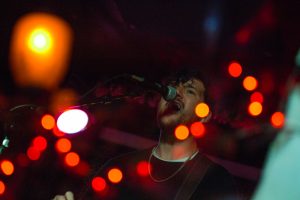
Ryan Noble of The Soft White Sixties.
Genera: And it was nice, too, because in the past we had written songs and then would play them live and play with them. So by the time went to the studio everything was already sorted out. This time, we would go to the studio without even full melodies. I think it was good for us because it put us all in the same headspace together and fostered more collaboration.
Eisenberg: One of the things we talked about was trying to capture the energy of our live performances in a record. When we communicated this to our producer Elijah Thompson, he was really helpful in creating a space for us to do this. His main thing was telling us that bands try to capture the feeling of a live performance in the studio but they are immediately put in an environment that is the exact opposite of a live show. You’re in there with one other dude, everybody is sober, and it’s the middle of the day. So we just went in there to have a good time, and tried to do anything to make it feel like 10 p.m. on a Friday.
Do you feel like an L.A. band now? Are you settled in?
Eisenberg: Yeah I love it here. I feel pretty settled. There is a really cool community here. I think we’re really engaging with a lot of other artists here more than we have in the past, even in San Francisco.
Genera: I really enjoy it a lot here. I feel like the biggest difference is kind of the unashamed approach to music entertainment down here. Everyone wears it on their sleeve. If you want to be a comedian, you’re a comedian and if you want to be a musician, you’re a musician. No one is afraid to say what they’re doing and to try to do it without fear.
Is it motivating that there are so many other bands here working hard and trying to make it?
Eisenberg: Totally. Bands go to each other’s shows a lot here, too. That’s what I mean by community. You go out to see some band and they blow your mind and then they come to see you and you try to blow their mind, you know?
Do you have any favorite venues to play in L.A. since you have been here?
Genera: Terragram Ballroom is really nice. The space is right and the sound is really good. I feel like it’s a venue that feels bigger than it is.
Eisenberg: There are a lot of really good venues going on in L.A. right now. It seems like all of these places are really active and filled with people who actually want to go see bands play. We’ve had some good Echo shows, and a really good release show at the Bootleg.
It seems like KROQ is really supporting The Soft White Sixties. What’s that relationship like?
Genera: These are things we have been really fortunate and lucky to have. That relationship developed because we knew Megan [Holiday] when she worked for Live 105 in the Bay Area. Its just crazy seeing the world work how it does. When we moved, she had moved. These are things that just happened organically.
Eisenberg: We are incredibly grateful for it. We are aware there are a lot of bands on major labels that have to fight for that shit. To have a station like that want to get behind us is amazing.
What is it like coming back to San Francisco to play shows?
Eisenberg: It’s great. It feels like we have multiple hometown shows now. With our latest release show, it now finally feels like we can have hometown shows in L.A. It always has felt like that in San Francisco. The goal is to have that in every city, eventually.
Follow writer Matthew Eaton at Twitter.com/MattnSoCal. Follow photographer Joaquin Cabello at Instagram.com/joaquinxcabello.
